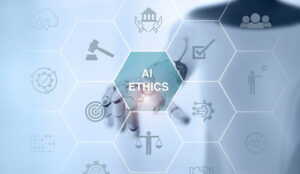In today’s technological landscape, Artificial Intelligence (AI) has emerged as a decisive factor in various industries, particularly in Customer Experience (CX) management.
Companies are leveraging AI to enhance customer interactions, streamline processes, and deliver personalized services.
However, as AI continues to play an increasingly significant role in shaping customer experiences, ethical considerations have become of paramount importance.
Responsible and ethical implementation of AI in CX is essential for maintaining trust, transparency, and fairness. How to ethically implement AI across customer experience?
- What are AI ethics?
- Transparency and accountability for an ethical AI in Customer Experience
- How can AI ethically protect data privacy and consent ?
- Artificial intelligence ethics: Bias mitigation and diverse viewpoints
- Job displacement and human contact
- Customer empowerment
- Monitoring and continuous improvement
1. What Are AI Ethics?
AI ethics refers to the moral guidelines guiding the responsible creation, implementation, and application of AI technologies.
With the increasing integration of AI into products, services, and daily living, it’s crucial for organizations to formulate policies that dictate its appropriate use.
At national and organizational scales, emphasizing AI ethics contributes to safeguarding businesses and individuals. This focus promotes the thoughtful creation and application of AI, reducing the potential for unforeseen adverse outcomes.
2. Transparency and Accountability for an Ethical AI in Customer Experience
From AI-driven chatbots to customer experience platforms, companies are leveraging AI to elevate CX. In this endeavor, maintaining ethical considerations around AI is essential.
One of the key ethical principles in implementing AI in customer experience is transparency. Transparency builds trust and ensures that customers know of the capabilities and limitations of AI-driven interactions.
Additionally, accountability is crucial. While AI systems can learn from vast amounts of data, they are not infallible.
If a customer experience driven by AI goes awry, mechanisms for accountability must be in place. This involves acknowledging errors, rectifying them promptly, and continuously improving AI models to prevent their recurrence.
For instance, consider an online store implementing an AI-based chatbot to assist customers. A customer named Maria was seeking toy recommendations for her nephew through the chatbot.
However, the chatbot provided an incorrect recommendation that was potentially unsafe for the child’s age. In response to this situation, transparency and accountability principles were implemented.
In terms of transparency, the chatbot acted honestly by acknowledging the error. The system explained that AI has generated the suggestion and apologized for the issue.
Furthermore, it allowed Maria to continue the conversation with a human agent, ensuring she had access to accurate and safe information.
On the other hand, the aspect of accountability was addressed exemplarily. The chatbot actively alerted a human Customer Service representative to the inappropriate situation.
Upon joining the conversation, this agent provided appropriate and safe recommendations for the nephew’s age.
The company also demonstrated accountability by committing to improving the AI system to prevent similar errors in the future.
By openly acknowledging errors, offering choices, and rectifying them efficiently, the company builds and maintains customer trust in the ethical implementation of AI in its services.
3. How Can AI Ethically Protect Data Privacy and Consent ?
In the digital age, respecting data privacy is essential for maintaining an ethical customer relationship. Companies must proactively ensure that personal data is handled securely and transparently.
Artificial Intelligence (AI) has made significant advancements in recent decades, and one of the most intriguing developments is AI’s ability to self-learn.
The self-learning process is challenging, especially concerning inputs from consumers. The information users provide to AI systems may contain private information.
This data can include online searches, social media interactions, online purchases, and more. AI can analyze this data to understand consumers’ needs and preferences better, enabling more effective personalization of services and products.
It is crucial to consider both the transparency of these inputs and privacy preservation.
Users must clearly understand how their data is used and what insights are drawn from it. Lack of transparency can lead to user distrust and privacy concerns.
Diabolocom values data privacy and takes it very seriously. Hosted on a European Cloud, our AIs are based on proprietary technologies specifically designed for customer relations.
4. Artificial Intelligence Ethics: Bias Mitigation and Diverse Viewpoints
One of the most critical challenges for an ethical AI is bias. AI systems can inadvertently perpetuate biases present in training data, leading to unfair or discriminatory outcomes.
In the context of CX, biased AI could result in unequal customer treatment based on race, gender, or socioeconomic status.
Can AI be bias-free ? In theory, yes. The accuracy of an AI system is intrinsically linked to the quality of the data it’s trained on.
By meticulously eliminating both overt and subtle biases related to race, gender, or other ideological factors from the training data, it’s possible to construct an AI that delivers decisions without prejudice.
Human oversight is essential for identifying and correcting any bias in AI-driven customer interactions.
AI used correctly can help reduce bias. Our goal is to eliminate biases in quality monitoring by analyzing larger data sets for precise scoring.
Rather than focusing solely on a sample, with the assistance of AI, we can broaden our analysis to monitor the quality of all outbound and inbound calls.
5. Job Displacement and Human Contact
While AI can automate many routine tasks and improve efficiency in customer experience, it is important to consider the potential impact on human employment. AI can be a valuable tool for enhancing the efficiency and effectiveness of work.
For example, it can assist customer service agents by providing relevant information and suggested solutions during customer interactions.
However, it is essential to approach this change with sensitivity and empathy. Employees may fear that automation and AI threaten their jobs.
Organizations must transparently communicate how AI will be integrated into operations and how employees can benefit from this technology.
Instead of replacing jobs, AI can enable employees to focus on more strategic and high-value tasks, such as solving complex problems that require human skills.
Finding the right balance between AI-driven efficiency and the value of human interaction is essential for ethically managing CX.
We strive to develop artificial intelligence that supports agents in their daily tasks, allowing them more time to focus on high-value activities.
6. Customer Empowerment
The ethics of AI in customer experience goes beyond merely using technology; it is about empowering customers.
AI can provide customers with information, recommendations, and solutions tailored to their needs. It can enable self-service options, giving customers greater control over their experiences.
Imagine a customer looking for a specific product or service. AI can analyze the customer’s purchase history, preferences, and past searches to offer relevant and tailored recommendations.
This allows the customer to make informed decisions and feel valued by the company, receiving recommendations that truly align with their interests.
Furthermore, the solution allows companies to use this information to design targeted campaigns for these customers. This increases sales and also makes campaign strategies more innovative and more effective.
Our AI-driven recommendations are transparent and aligned with the customer’s best interests and latest policies rather than being solely profit-driven.
7. Monitoring and Continuous Improvement
Ethics in AI is not a one-time consideration; it is an ongoing commitment. Companies must implement mechanisms for continuous monitoring to track the performance of AI systems, identify potential issues, and make necessary adjustments.
Regular audits, feedback cycles, and iterative improvements are essential to ensure that AI-driven customer experiences remain ethical and effective.
In conclusion, while the infusion of AI into customer experience management promises transformative benefits, it also raises ethical challenges that must be addressed.
Principles such as transparency, accountability, data privacy, combating bias, fostering human interaction, empowering customers, and ongoing refinement stand at the forefront of creating an Ethical AI framework for customer experience.
Drawing inspiration from the four core values of ethics for AI as outlined by UNESCO, businesses can effectively channel AI’s capabilities, ensuring they do so with integrity, trust, fairness, and genuine respect for their clientele.
Author: Guest Author
Published On: 13th Nov 2023 - Last modified: 9th Dec 2024
Read more about - Guest Blogs, Diabolocom



































